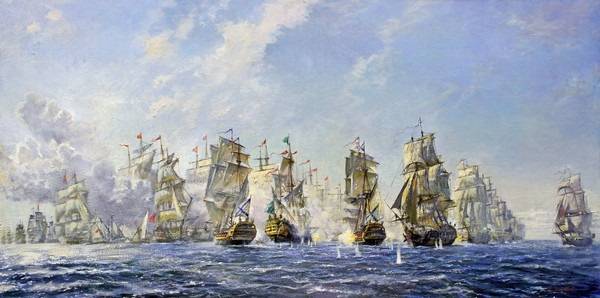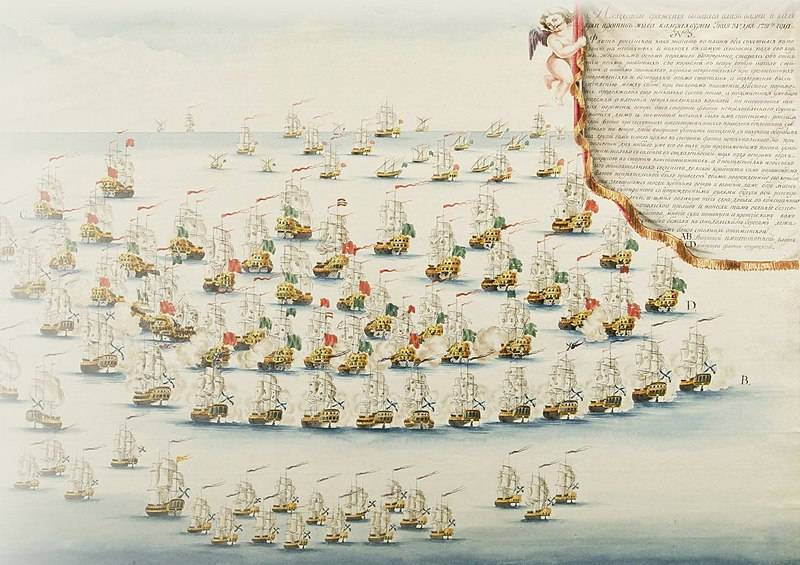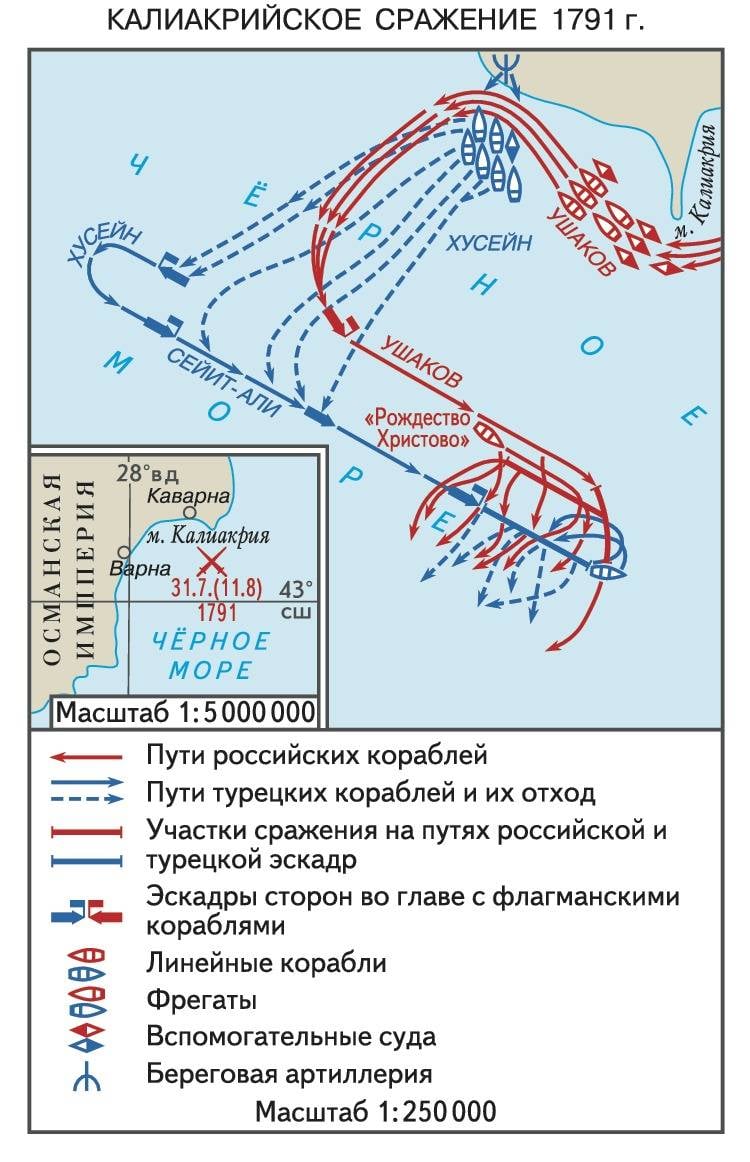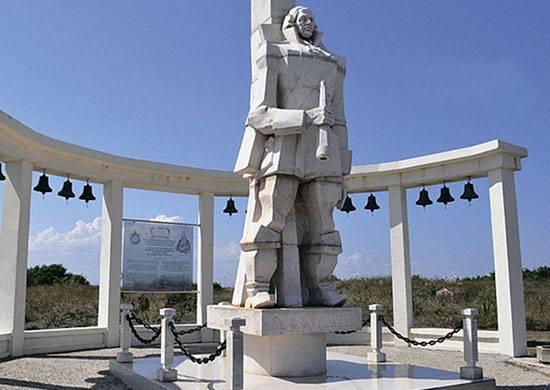The Turkish fleet was "already completely defeated to the extreme"

Battle of Cape Kaliakria on July 31, 1791. Artist I. N. Dementyev
Turkey is defeated
The campaign of 1790 was disastrous for Turkey. The Russian army on the Danube takes the fortresses of Kiliya, Tulcha and Isakcha. Alexander Suvorov destroys almost the entire Turkish army in Izmail. The Russian fleet under the command of Ushakov smashes the Turkish Navy at the Kerch Strait and Cape Tendra.
Porta leaned towards peace, as her resources were depleted by the war. For its part, Petersburg also wanted peace, since Russia had to fight on two fronts (the war with the Swedes in 1788-1790). Also, Russia had to take into account the possibility of an uprising in Poland, against us by Prussia, for which England stood. Therefore, it was necessary to keep large forces in the western direction. About half a million recruits were drafted into the army, the government feared a new Pugachev regime.
However, the West opposed the peaceful Russian-Turkish negotiations.
Russia's successes in the Balkans and in the Black Sea region alarmed the Western powers. England, Holland and Prussia supported Turkey. The Prussian king Frederick Wilhelm II concluded an agreement with Turkey, promising the inviolability of the Ottoman possessions, deployed a large army on the Russian and Austrian borders and began to persuade the Swedes and Poles to war with Russia. England promised to send its fleet to put pressure on Petersburg. Having suffered a series of setbacks on the Turkish front, experiencing problems within the country, and under pressure from Prussia, England and Holland, Austria - an ally of Russia, signed a peace treaty with the Turks.
As a result, Turkey decided to continue the war, send new troops to the Danube Theater during the 1791 campaign and try to land troops in the Crimea in order to raise an anti-Russian uprising there.
However, Turkey's hopes for help from the West did not materialize. In England, the policy of the Pitt cabinet met with resistance from the opposition, which did not want to complicate relations with Russia at a time when the French question was aggravated. In France in 1789 the revolution began, which more and more riveted the attention of London. Therefore, the English fleet remained at home. And Prussia, not receiving help from the British, did not dare to start a war with Russia. The Prussians preferred to negotiate with Petersburg and divide Poland.
The Russian high command, proceeding from the unfavorable foreign policy situation (large forces had to be kept on the northwestern and western borders), first decided to go on the defensive. However, then it was decided to carry out a number of offensive operations. Repnin's army crossed the Danube and defeated the 80-strong Turkish army at Machin (How the Russians crushed the Turkish army in the Battle of Machin), Gudovich's Kuban-Crimean corps stormed the "Caucasian Izmail" - Anapa (How the Russians took "Caucasian Izmail"), where a large enemy corps was destroyed.
As a result, the grand vizier again sat down at the negotiating table.

The course of the battle in the painting from the end of the XNUMXth century. A. Depaldo
The appearance of the enemy
The Russian naval fleet, located in Sevastopol, in May 1791 received the task of looking for Turkish ships, disrupting enemy communications going from Constantinople to the Danube.
On July 3, 1791, the Turkish-Algerian fleet appeared at Anapa. The Ottoman command planned to land troops here, which, with the support of fleet was supposed to create a threat in the Crimea. The sea was strewn with the bodies of those killed in the battle for Anapa, the ships began to ferment crews and soldiers who were afraid of landing. Therefore, the Ottoman commanders took the fleet to the Bulgarian coast, becoming in Kaliakria in the Varna region, under the cover of coastal batteries.
Kapudan Pasha Hussein and the Algerian Vice Admiral Seit Ali Pasha, having superiority in ships and frigates, hoped to defeat the Sevastopol squadron. Seid-Ali promised the Sultan to bring Ushakov to Istanbul in a cage.
The Turkish-Algerian fleet consisted of 18 battleships, 17 frigates (including 10 battleships capable of standing in line with battleships), about 50 small ships. A total of about 1500 guns.
Fedor Fedorovich Ushakov was in Sevastopol at that time, as he could not equip the ships in time. The north-westerly wind also interfered. The fleet left Sevastopol on July 10, 1791. On the 12th, the Russians saw enemy ships heading for Sevastopol. The opponents were going to start a battle, but due to the lack of a favorable wind, they could not maneuver and dispersed in two days. The Ottoman fleet left towards Varna. The Russians returned to Sevastopol to replenish supplies.
On July 29, the Russian fleet went out again to search for the enemy. The Sevastopol squadron included 16 ships, 2 frigates, 2 bombardment ships and 17 auxiliary ships. Ushakov's squadron headed south-west, taking advantage of the favorable wind, they went under full sail and two days later reached the Turkish coast. Then the fleet moved along the coast. The Ottomans at this time were at Kaliakria. Being on their territory, under the protection of coastal batteries and having superiority in the number of pennants and naval guns, the Ottoman admirals felt completely safe. Some of the teams from the Turkish ships were on the shore.

Battle
On the morning of July 31, 1791, Hussein Pasha was informed that ships appeared on the horizon. Soon the Turks saw that this was the Russian fleet.
The closer Ushak Pasha approached, the more obvious his determination to start a battle became. To stun the enemy and win an advantageous windward position, the Russian admiral made a bold decision: to send his ships between the coast and the Ottoman fleet. Sevastopol squadron at 14 o'clock. 45 minutes passed Cape Kaliakria and in three columns confidently walked along the coast. Turkish coastal batteries began shelling, but the Russians continued to confidently move forward. Cutting off the Ottomans from the coast, the Russians took up an advantageous position for the attack.
This caused confusion among the enemy.
The Turks cut the anchor ropes, set the sails and went out to sea. The first to follow was the "Mukkaddim-i Nusret" of Seit-Ali, Hussein tried to hold on to him, but his "Bahr-i Zafer" had an shortage in the crew and soon fell behind. The Ottoman ships were leaving the sea in such a hurry that with a fresh wind they could not keep the intervals between themselves, so some ships collided with each other. At first, the Turkish fleet went without formation. Then Hussein Pasha raised the signal to build a battle line to starboard tack. Turkish ships began to occupy their assigned places and formed a battle formation. But at this time the commander of the vanguard Seit-Ali, contrary to the signal of the commander-in-chief, turned the fleet behind him and arranged a line on the port tack.
The Turks were able to restore order. Meanwhile, the Russian ships, following Ushakov's instructions, overtook the enemy at maximum speed. The Russian fleet on the move rebuilt from three columns into a battle line parallel to the enemy armada. The Ottoman vanguard made an attempt to come forward, take a windward position and restrain the Russian maneuver. Ushakov guessed the enemy's maneuver. The flagship Rozhdestven Khristovo, under the command of Captain 1st Rank Yelchaninov, approached the Turkish junior flagship, bypassed it in front and opened fire. The Russians took Seid Pasha's ship for the main flagship, since it was the most powerful in the Ottoman fleet. Following the flagship, the entire Russian squadron approached the enemy and opened fire.
The Black Sea gunners fired much better than the enemy. Fires broke out on Turkish ships. The ship Seit-Ali suffered most of all, on which the fire of several of our ships was concentrated. There were many killed and wounded on the ship. The Turkish admiral himself was wounded. The Turkish junior flagship dropped out of the battle. His place was taken by two battleships and two frigates, which tried to cover their flagship. The ships "Alexander Nevsky", "John the Baptist" and "Stratilat", commanded by the captains of Yazykov, Baranov and Selivachev, concentrated fire against them. Soon the enemy vanguard was forced to turn back.
After the defeat of the enemy vanguard, the battle line of the Turkish fleet was disrupted. Confusion began again in Hussein Pasha's fleet. The Ottoman fleet, as Ushakov noted, was
The Turkish fleet was outflanked from two flanks, and the enemy began to retreat indiscriminately. Only thick powder smoke, calmness and the onset of night saved the Ottomans from complete defeat. At half past eight in the evening Ushakov stopped the pursuit, and the fleet anchored. At midnight the wind rose, and the Russians began pursuit, but there was no sense in it.
The next day, Ushakov received news of the conclusion of an armistice with the enemy and turned the ships to Sevastopol.
Results
The next day the Turkish fleet was scattered between Varna and Constantinople. Many ships were badly damaged, without masts and yards, some could only move with the help of tugs, others were washed ashore in Anatolia. Several ships reached Constantinople and made a lot of noise with their appearance: the ships were wrecked, without masts, with many dead and wounded, who were lying on the decks. The Turkish fleet has lost its combat capability.
The Ottoman authorities were afraid that the Russian fleet would land troops in the Bosphorus. The Turks frantically began to strengthen the shores of the Bosphorus and the fortresses of the Strait zone. Ottoman dignitaries, fearing the wrath of the Sultan, reported to him about the victory of Seit Pasha's squadron over the Russians, who retreated to Sevastopol.
On October 14, Ushakov was awarded the Order of St. Alexander Nevsky. In the rescript of the Russian Empress Catherine II, it was noted on this occasion:
The commanders of the avant-garde and rearguard, Major General of the Fleet Golenkin and Brigadier of the Fleet Pustoshkin, who distinguished themselves in the battle, were respectively awarded the Order of St. Vladimir II degree and St. George III class. 24 officers were awarded orders and 8 - golden swords. The lower ranks received a ruble each.
Unable to continue the war on land and at sea, without receiving help from the West, Turkey signed the Yassy Peace Treaty in December 1791.
The Northern Black Sea region, including the Crimea, was assigned to Russia. The Russians took over the area between the Southern Bug and the Dniester. In the North Caucasus, Taman became Russian, the border was established on the river. Kuban. The port refused to claim Georgia.

Monument to Admiral FF Ushakov at Cape Kaliakria. Bulgaria. Opened on August 10, 2006.
Information